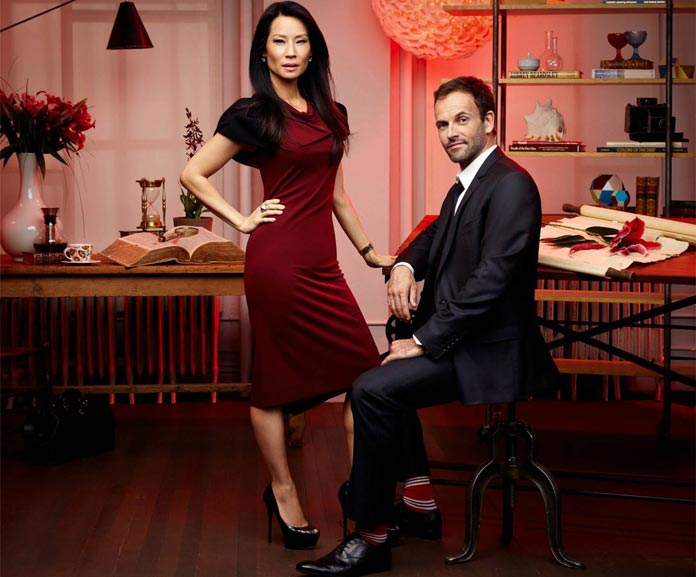Assemblog: May 31, 2013 – Critiquing The Role Of Women in Hollywood
Published on May 31st, 2013 in: Assemblog, Critics/Criticism, Feminism, Film Festivals, Movies, TV |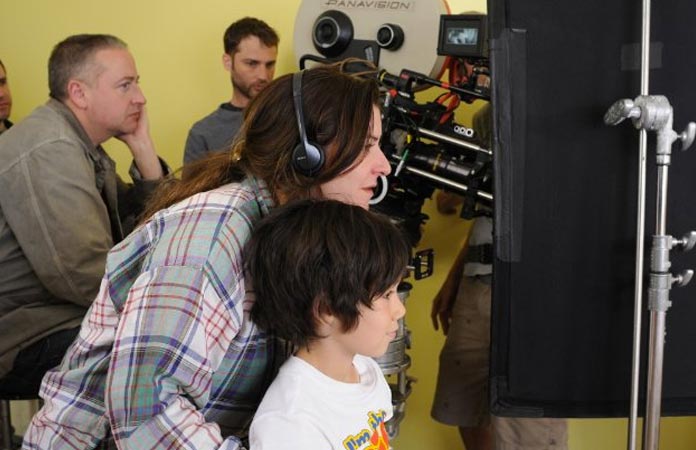
Lynn Ramsay on the set of We Need To Talk About Kevin
New this week on Popshifter: Jeff presents the last days of Metal Mayhem with Iron Maiden and Spinal Tap; Chelsea describes the “smart, talented trio” known as Hot Club of Cowtown in her review of their new Rendezvous in Rhythm album; Lisa praises Elementary as “the abomination that wasn’t”; I share 15 hilarious minutes with Doc Hammer and Jackson Publick of The Venture Bros., have a dance party with King Tuff’s reissued Was Dead album, and fall in love with Charles Bradley: Soul of America.
The Abomination That Wasn’t: CBS’s Elementary
Published on May 30th, 2013 in: Current Faves, Feminism, TV |When CBS announced that it would be doing Elementary, a contemporary take on Sherlock Holmes like the BBC’s Sherlock, the loudest reactions were one of horror. Some of the misgivings were understandable: after all, it was an American attempt to emulate something that had already been done, on a major network and in prime time. It wasn’t even going to be set in London—a first for any interpretation of the source novels by Sir Arthur Conan Doyle. Most controversial of all was the casting of Lucy Liu as Holmes’s sidekick, now named Joan Watson. A lot of racist and sexist things were said about that, under the guise of preferring “authenticity.” In the end, though, Elementary, which had its season finale on May 17, turned out to be a highly entertaining and solidly made show.
Assemblog: May 17, 2013
Published on May 17th, 2013 in: Assemblog, Feminism, Film Festivals, Horror, Movies, Trailers, TV |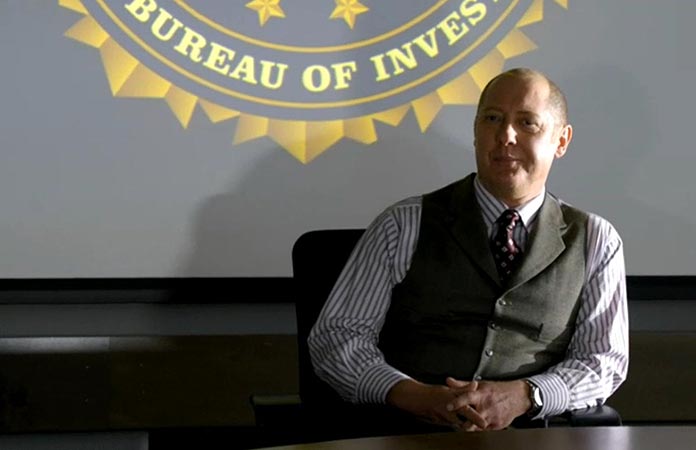
James Spader, from NBC’s The Blacklist
New this week on Popshifter: Chelsea thinks Xenia Rubinos’s Magic Trix is a “thrilling listen”; Metal Mayhem continues with Jeff’s take on Dangerous Toys and Judas Priest; Jeff also says that Big Country’s The Journey is the best new album he’s heard this year; Melissa B. parties traditional style with the new album from Kermit Ruffins and gets transported to the past with the reissue of Marty Robbins’s El Paso City and Adios Amigo; I recommend both the glam psychedelia of Burnt Ones’ You’ll Never Walk Alone and the party music of Dead Ghosts’ Can’t Get No, and revisit 2002’s excellent, unsettling One Hour Photo, recently released on Blu-Ray.
Music Review: Xenia Rubinos, Magic Trix
Published on May 13th, 2013 in: Current Faves, Feminism, Music, Music Reviews, Reviews |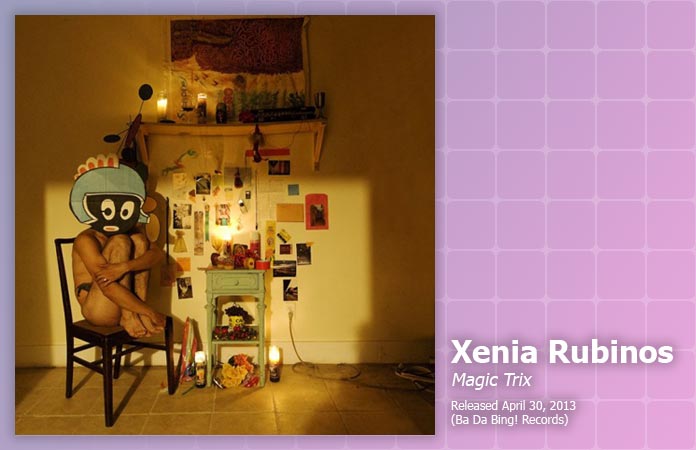
On Magic Trix, Xenia Rubinos sounds like a radio caught between two frequencies. The first station carries brassy 1930s show tunes, a capella field recordings of folk songs, multi-tracked choruses, and lushly melodic whispered confessions. On the other, psychedelic keyboard freakouts, skittering drums, thumping hardcore declarations, and a cacophony of characters rule the day. Binding the disparate styles together is a soupçon of feedback from an analog keyboard and Rubinos’s force of nature vocals.
Upcoming Art Show: Vicki Berndt, Idle Worship: Jesus Camp and Drag Keanes
Published on May 3rd, 2013 in: Art, Feminism, Music, Upcoming Events |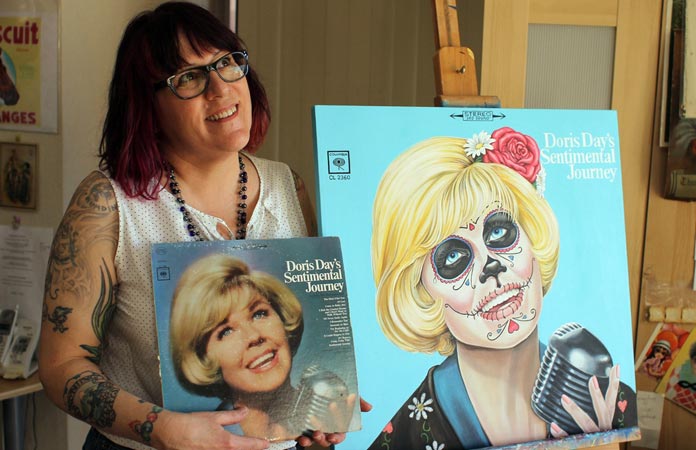
In 2008, I conducted an interview with the fabulous artist and all-around amazing lady Vicki Berndt. In it, we discussed her artwork, photography, fanzines, fandom, the punk rock aesthetic, and much more.
La Luz de Jesus Gallery in Los Angeles is presenting an exhibit of Vicki’s work that runs from Friday, May 3 through Sunday, June 2. She’ll be present at the artist reception on Friday, May 3 from 8 to 11 p.m.
For more information on Vicki and her art, be sure to check out her guest appearance on the “Over Under Sideways Down” podcast on LuxuriaMusic. It aired on Wednesday, April 24 and you can listen to the show on the LuxuriaMusic website (hour one and hour two).
La Luz de Jesus Gallery is located at 4633 Hollywood Blvd. In Los Angeles, CA. You can contact the gallery at 323-666-7667 or via their website at www.laluzdejesus.com. Take a look at the exhibit
online, too!
Check out more photos of Vicki’s art and her studio.
Music Review: The Chapin Sisters, A Date With The Everly Brothers
Published on April 23rd, 2013 in: Current Faves, Feminism, Music, Music Reviews, New Music Tuesday, Reviews |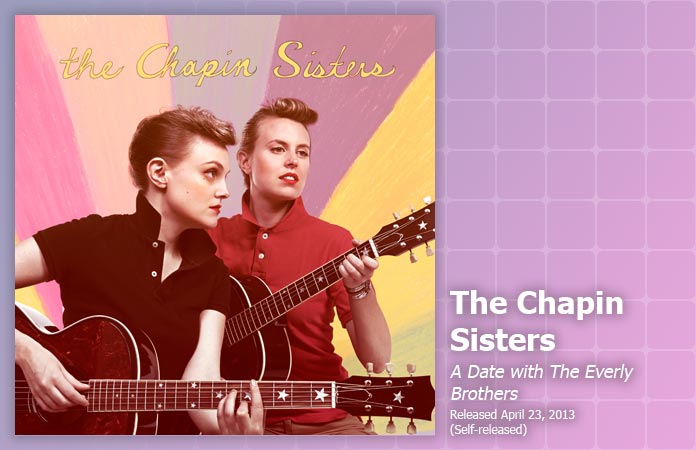
Like The Everly Brothers, The Chapin Sisters come from a musical family. Their father is Grammy-award-winning musician Tom Chapin; their uncle was folk singer and humanitarian Harry Chapin. This pedigree shows in their most recent release, A Date With The Everly Brothers, an album of 14 cover songs by the beloved duo.
A Date With The Everly Brothers focuses on the songs released by the siblings between 1957 and 1961, the most commercially successful period in their career. About half of the songs are Everly originals; most of the rest are Felice and Boudleaux Bryant compositions from the brothers’ tenure on Cadence Records in the late ’50s.
Music Review: IO Echo, Ministry Of Love
Published on April 18th, 2013 in: Current Faves, Feminism, Music, Music Reviews, Reviews |
There are albums so good, the task of describing them seems overwhelming. Yet the glorious challenge of explaining why the songs are amazing can be a real honor, especially if even one person reads my paltry words, buys the album, and is thus transported.
So it is with Ministry of Love, the debut album from the duo of Ioanna Gika and Leopold Ross, who form IO Echo. They marry the proto-goth of early Cure and Siouxsie with the lushness of Cocteau Twins and School of Seven Bells in songs informed by the subtle yet strong undercurrents of Asian sonics. Despite what my descriptions might imply, Ministry of Love isn’t bleak. The euphoric pop of songs like the title track and “Ecstasy Ghost” ensure that the album never feels morose, although it skirts the edges of unsettling.
Music Review: Lynsey de Paul, Sugar And Beyond/Into My Music Anthologies
Published on April 10th, 2013 in: Current Faves, Feminism, Music, Music Reviews, Retrovirus, Reviews |By Hanna
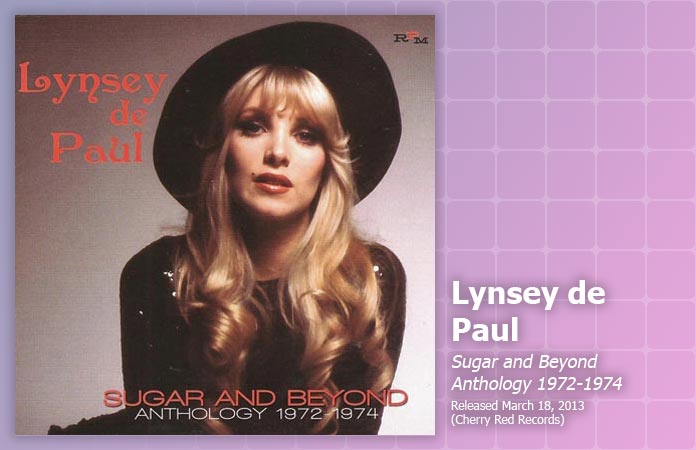
The entire ‘70s catalogue of pioneering female singer/songwriter Lynsey de Paul has finally been collected in two new anthologies: Sugar and Beyond 1972 – 1974 and Into My Music 1975 – 1979. Using exclusive material and information from Lynsey de Paul herself, this is a unique collection, signifying a new chance to discover her work and to grant it the recognition it deserves.
Music Review: Wendy & Lisa, Wendy and Lisa
Published on March 25th, 2013 in: Feminism, LGBTQ, Music, Music Reviews, Reviews |By Paul Casey

Wendy & Lisa have put out five albums and one EP of original material during the years they have worked as a duo. For such a talented pair this does not seem like nearly enough. The benefit of having so few albums is, however, there is no off period. Their debut, Wendy and Lisa, came out in 1987 and started a (short) string of great albums. It is a classic of the 1980s, and unavoidably a document of what Prince lost when he fired Wendy, Lisa, and Bobby Z. (who co-produces the album).
Feminism, Sexism, and Mocktresses: The Hollywood Reporter Gets Ugly
Published on March 14th, 2013 in: Feminism, Movies, Over the Gadfly's Nest |
Diane Kruger
The Hollywood Reporter is certainly not against whoring themselves out for fashion-focused red-carpet coverage. So this repulsive mixture of irony and condescending sexism in their piece about the rise of the “mocktress”—the new version of the model-actress—makes my blood boil. Fashion blogger Merle Ginsberg calls out Jessica Alba, Kate Bosworth, Diane Kruger, and others for being superficial, status-grabbing, money-grubbing paper dolls. Some choice quotes:
Yet she might not have done a project in years, and if she has, well, you haven’t heard of it. Still, she is a legitimate actress, having starred in a few rom-coms, action flicks or horror films, looking gorgeous in all of them. No fake noses or weight gain for this girl.
Today, said actress spends the majority of her time modeling on arrival lines as opposed to runways. Remember when models just wanted to be actresses? These days, a certain lanky, large-eyed genre of B-list-and-lower actresses have, for all intents and purposes, added “model” to their business-savvy hyphenate titles.
Alba alone attended about 43 events in 2012—the old “opening of an envelope” line comes to mind—and for tres chic Diane Kruger, it was 31 events. Kruger is becoming better known for being well-dressed than her occasional yet interesting acting choices. No doubt she makes more money that way.
I scarcely know where to begin. Rom-coms, action flicks, and horror films are not “real movies” according to Ginsberg and even if they were, they don’t count if you “haven’t heard of them.”
Apparently Ms. Ginsberg has private investigators following the “mocktresses” around because she clearly knows what they “spend the majority of their time” doing: “modeling.” Never mind that Alba has had a couple of kids in the last few years and has done a fair bit of charity work. Never mind that actresses, no matter how beautiful, typically get offered less interesting or rewarding scripts than their male counterparts. Diane Kruger is basically accused of selling herself out for money and clothes in lieu of a “real job.”
It doesn’t help that the article also mentions those celebrities who monetize their exploits or their rich and famous status to gain more riches and fame (Kim Kardashian); those still-valid criticisms feel tacked on. The damage is already done. Read the whole thing if you think you can stomach it.
